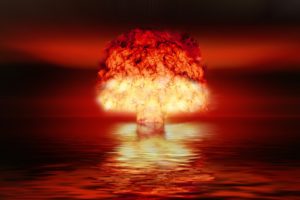
73 years ago today, the United States took one of the final steps to bring victory to the Allies in World War Two by dropping an Atomic bomb on the Empire of Japan. Eleven days prior to this, the Allied powers of the United States, Great Britain, and China issue the Potsdam Declaration to Japan. The declaration was an ultimatum that listed several Allied demands, which most importantly included “unconditional surrender” by Japan. Japan had one alternative to surrender, and that was to accept “prompt and utter destruction.” Japan responded by ignoring the ultimatum. Ten days prior to the ultimatum, on July 16, 1945, the United States successfully detonated the first nuclear-fission bomb (nicknamed “Gadget”) at Alamogordo, New Mexico.
On August 6, 1945, the United States dropped “Little Boy” (categorized as a uranium gun-type bomb) on the Japanese city of Hiroshima. Despite the fact it was a military center, Hiroshima had previously been spared from the mass fire bombings other Japanese cities, such as Tokyo, had been subjected to. “Little Boy” destroyed almost 70 percent of the city structures and, after several months, close to a third of the inhabitants (more than 100,000).
The bombing of Hiroshima was followed three days later, August 9, 1945, with the dropping of “Fat Man” (a plutonium implosion-type bomb) on the Japanese city of Nagasaki. Though Nagasaki was a major ship building center, it too had previously been spared from mass bombing by the Allies. Nagasaki, a smaller city than Hiroshima, suffered fewer losses altogether; though the casualty rate (40,000 plus) and damage to infrastructure was considerable. With the realization that the Allies were willing and able to deliver on their promise of “prompt and utter destruction,” and the declaration of war by the Soviet Union the day after Hiroshima; the Empire of Japan began proceedings to negotiate a surrender on August 10th. On August 14, 1945, (V-J Day), the Empire of Japan announced it’s surrender to the Allies; effectively ending the greatest war in Earth’s history.
Fast forward to modern times. It is not uncommon to walk into a high school or college history class where snowflakes living comfortably, almost three-quarters of a century after these events, have the arrogance to debate the morality of the Atomic bombing of Japan in World War Two. This in itself does not bother me as much as the fact no one bothers to debate the morality of the Japanese attack on Pearl Harbor or the Rape of Nanking. A considerable amount of college students can’t tell you anything about how Japan conducted the war. Yet, they cannot wait to establish the fact the United States is (thus far) the only nation to have used the Atomic bomb in war; as if this fact alone is an adequate assessment of America as a whole. Generally speaking, any attempt to measure morality during war time seems like an exercise in futility. However, if one wishes to attempt to measure it as accurately as possible, one needs to measure it relative to the time and space in which the war occurred. That’s a can of worms to open another time.
To have any realistic understanding of the situation, one has to know how the Japanese were fighting in the months leading up to the Atomic bombing. The Battle of Okinawa is the best example of how costly the war with the Japanese was becoming (both to them and the Allies). Over a period of about ten weeks, the Japanese killed more than 12,000 Americans while suffering more than 100,000 casualties themselves. Moreover, some 100,000 civilians died; some in combat, others having been forced by the Japanese to kamikaze. It was one of the bloodiest battles of the bloodiest war in history; indeed, certain days of the battle were the bloodiest days for the United States during the war.
The argument over whether the United States should have dropped the Atomic bombs is absurd. Perhaps a more valid debate is whether the United State should have dropped the bombs sooner. Or rather, whether the attack on Okinawa should have been postponed until after the successful detonation of “Gadget.” Had the U.S. done so, the loss of hundreds of thousands of lives may have been prevented. Having said that, far be it from me to criticize President Truman for his decision making during that complicated and tumultuous time (keeping in mind he had assumed the presidency about two weeks after the American attack on Okinawa).
We’ll never know how an invasion of the Japanese main islands would have turned out. We can only estimate based on the events that unfolded prior. The more the Japanese Empire crumbled, from Guadalcanal to Okinawa, the more intensely they fought. It is reasonable to assume the Japanese would fight for their home islands with the equivalent suicidal ferocity with which they fought for comparatively trivial islands such as Tarawa and Iwo Jima. Based on the conduct of Japanese forces as the conflict progressed, the defense of the Japanese main islands would have been savage and destructive on a proportionately larger scale. This very likely would have led to casualties of an unprecedented scale (particularly on the Japanese side).
If one questions the morality of the Atomic bombing, why not also question the morality of the bombing of Tokyo? Is the morality of weapons of war only relative to the amount of death and destruction that can be caused within a certain amount of time? If Hiroshima and Nagasaki had been bombed prior to an Okinawa invasion, Truman may have been able to save hundreds of thousands of lives. It is important to remember this: the Allied bombing of Japan that took place between March and August of 1945 (mostly by American B-29 bombers) destroyed 75% of Japanese urban areas.
Regardless, the Japanese showed no signs of wanting to surrender. Had the Atomic bomb not been a viable option, the Allies would likely have increased the bombing of Japan’s main islands with napalm and other heavy bombs. A look at the number of B-29s the United States had in production in the last months of the war confirms this. We cannot know how many deaths would have resulted from prolonged bombardment of Japan. It is not unreasonable to guess the damage may have been more extensive than anything two Atomic bombs could have caused.
To those who judge America harshly simply for using the Atomic bomb: study your history, and question your professors! Why not evaluate the morality of the attack on Nanking and the psychological ripple-effect of Chinese children having seen their mothers and sisters raped by Japanese Imperial Soldiers? Why not evaluate the morality of a surprise attack on a U.S. naval base? Why has our education system become so unevenly heavy-handed in judging the actions of their own country; actions that were made decades ago?
I know why: because preppy college students (and professors) sitting in air-conditioned classes with laptops and $5 Starbucks usually have no reasonable concept of war or what it’s like to have the existence of your nation, or it’s way of life, threatened with destruction. For some sickening reason, it’s trendy for so-called intellectuals to impose their own moral compass on a nation which has brought more prosperity to Japan than it has inflicted any real lasting damage. Western culture has become so advanced and comfortable, it has become common to measure it with regard to perfection; as opposed to acknowledging that war is Hell, and the sins of the United States are the sins of mankind. Again, this is a topic for another day.
I pose to bleeding-heart Westerners that the use of the Atomic bomb stands the test of time very well, morally speaking. Besides not using it prior to Okinawa, my only regret is that President Truman did not decide to use the Atomic bomb again in Korea. One could easily make the argument that hundreds of thousands of American, Korean, and Chinese lives may have been saved if he had. I won’t judge him for not using it; who knows what guilt he may have felt from using it twice prior. Again, I am able to cast judgement from a point in the future; knowing what casualties resulted from the Korean War (and may yet still result).
Bottom line: war is Hell. When all is said and done, the United States has a history of conducting itself relatively well during war time. The Empire of Japan initiated a war it could not finish. The United States fought it to finish it. All things considered, Japan made out very well after the war. They were allowed to keep their Emperor. The United States gifted to them the 2nd biggest economy in the world for decades following World War Two. Furthermore, they have been allowed to teach younger generations of Japanese a revisionist history which precludes any responsibility on the part of Japan for bombing Pearl Harbor, or killing millions of Chinese, Koreans, Vietnamese, Filipinos, Pacific Islanders etc. Per capita, the Imperial Japanese Soldier was the most effective killing machine of all sides during World War Two. The Japanese killed about seven times as many people as they lost; mostly civilians. I don’t expect anyone to blame Japan for those transgressions now, anymore than I expect blame to be laid on the United States for using the Atomic bomb. I simply expect for history to be taught factually and objectively. When I see the amount of criticism the U.S. suffers at the hands of it’s young generations, I know that is not happening.
~AD
Share This: